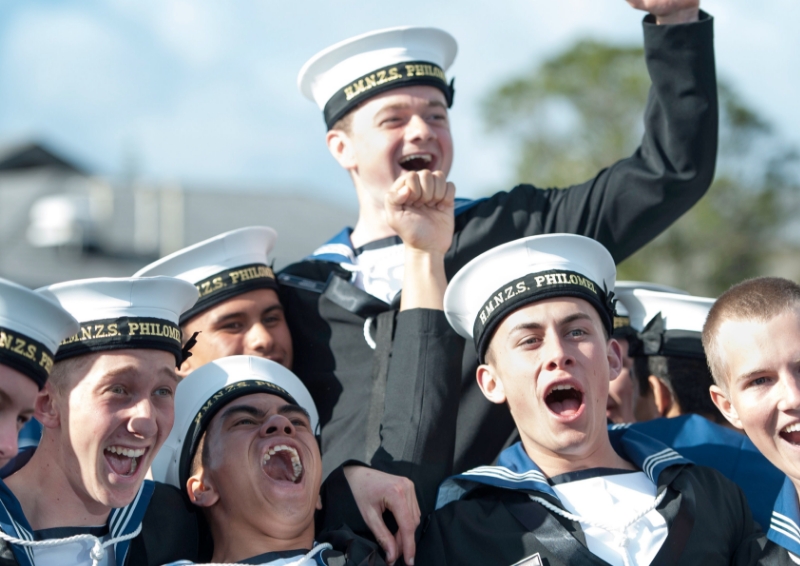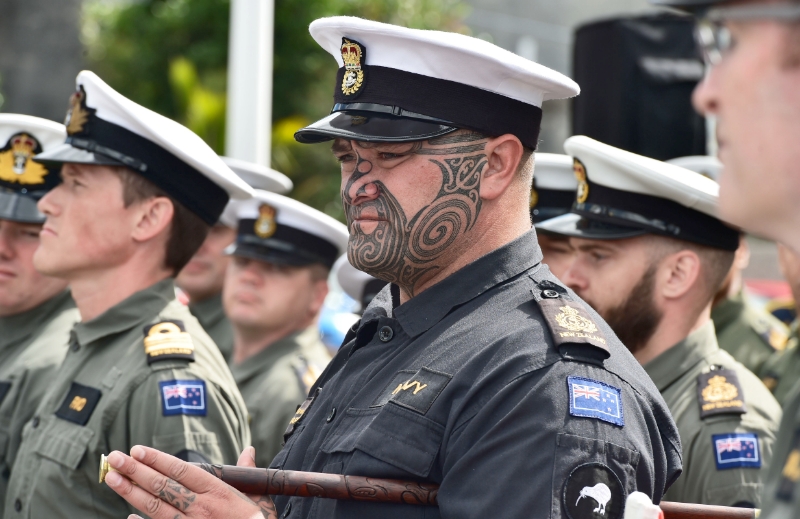Ahurea - NZDF culture
Ahurea Ope Kātua
Who we are
Our Defence Force is made up of around 14,500 people. We are a diverse workforce, comprising around 9,000 Regular Force, 3,000 Civilian and 2,000 Reserve Forces staff, supported by our families and veterans who are our broader Defence Community and the foundation of our Force for New Zealand.
Our rich history has shaped our military customs and protocols, and these reinforce our culture and ensure valuable traditions are not lost. Marching, saluting, and the rank system are just some of the visible features of military culture. Our values are the foundation upon which NZDF culture and professionalism are based. These are the moral principles and standards upon which we interact with others, make judgements and take actions.
Our professionalism and excellence as a small defence force is recognised around the world. NZDF has established a proud tradition of commitment, determination and ingenuity in times of conflict and peace. Acknowledging and upholding the principles of Te Tiriti o Waitangi is an integral part of the Aotearoa New Zealand perspective that helps shape our Defence culture.

What is culture?
Culture is the beliefs and behaviours that we encourage and tolerate. Culture is shared. All of us are the culture; it's not something we are ‘in’. Our individual beliefs and behaviours, and what we encourage or discourage in others, makes a difference.
Why is it important?
Culture is important to us because what we believe and how we behave each day determines how successful we are as an organisation.
In the NZDF our desired or optimal culture is defined by our values:
- Tū kaha - Courage - to speak up when we disagree or when someone is not performing in line with our expectations, say no when required, to question and suggest new ways of doing things. At times, it is the courage to put our own lives at risk to protect others.
- Tū tika - Commitment - to put our best foot forward and always do our best. Sometimes it involves putting the NZDF before ourselves and our families, but that is only when it’s really required and is not about over working.
- Tū tira - Comradeship - listening to others, supporting others and treating everyone with respect even if we may disagree with them or if they’re different to us.
- Tū māia - Integrity - to do what’s in the best interests of the NZDF.
It is up to all of us to ensure we live our desired culture each day. What's one thing you could do today to help shape our culture? How might you behave differently? What could you do to encourage different behaviours in others?

What impact can culture and service life have on my health?
The nature of service life can place unique demands on NZDF personnel, in ways that are uncharacteristic of most occupations. And whether or not we are wearing a uniform, NZDF members are also likely to experience similar physical health issues as other New Zealanders, and the same challenges - be that with relationships, raising families, or navigating life’s common hurdles.
We must remember the impact of service life on our broader defence community too. Our families often make considerable sacrifices for their partners, children and parents. Families are also often geographically separated from their usual support networks. When loved ones are away on training, deployments and activities it can be an especially difficult time - both from a practical and emotional perspective. It’s easy for parents to put their own health care or concerns on hold, to prioritise care and support for their loved ones.
And when we leave service, particularly after a long military career, navigating the change in culture, separation from mates, and adapting to ‘civvie street’ can sometimes be hard (for both transitioning members and their families). Sometimes health issues can emerge down the track as we age and through changing life circumstances.
Culture and health
Living our values and ensuring we have a positive workplace culture will help us thrive at work and feel supported when we are going through tough times.
We make a commitment to ensuring our heath is the best it can be, both for our own wellbeing and the performance of the team. Our culture gives us the courage to speak up when we're not going ok, and gives us confidence that seeking help early is the right thing to do – both for ourselves and for our wider team.
Aspects of our culture can also get in the way sometimes. Inside the NZDF, we know that when personnel are not tracking okay it's sometimes hard for them to ask for help. It may be that they don’t recognise that they're not going ok, or they may think that others' needs are more important than their own.
‘Looking back now I can see that my outbursts and erratic behaviour were not normal, and these caused heartache and depression for my wife as I worked through dealing with it by myself. It was only when coming to a pinnacle of emotion, that it dawned on me that there was an issue. Unfortunately this came too late and took 4-to-5 years, by which stage my relationship had suffered significantly.’
- NZDF member 'Dave', story shared below
The concept of ‘mental toughness’ that serves so well during operations can also act as a barrier to recognising and acknowledging vulnerability. Asking others for help can feel difficult (because of pride or embarrassment), or people may worry about perceptions (such as being seen as weak) or about career impacts and their ability to be deployed in future. Sometimes it’s often only when things reach a crisis point that people reach out for help or it becomes obvious that people need help.
‘Part of the reason I took so long to get help was that I didn’t want to be branded or ‘labelled’, and/or waste people's time on what I thought was a private matter. Knowing what I know now, I would realise earlier that my experiences on deployment had had an impact - and my reactions were not uncommon, given these experiences. I learned that sometimes I can’t go it alone, that trying to do so has an impact on me and those around me, and that getting help (in my case from the padre) can help me find a way through.’
- NZDF member 'Dave', story shared below
Seeking help early will speed your recovery, but sometimes it is hard to ask for help. NZDF Health providers and command are good sources of internal support. Often a mate, family member or trusted colleague is a good place to bounce things around initially if you're unsure. External confidential professional support is also available through the NZDF Wellbeing Support.